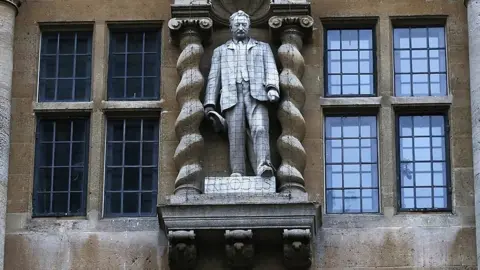Cecil Rhodes: Renewed calls to remove Oxford Uni statue
 Reuters
ReutersCampaigners protesting against the statue of imperialist Cecil Rhodes say Oxford University has "failed to address its institutional racism".
The "Rhodes Must Fall" campaign, among other student groups, is demanding the university removes the statue.
Protesters will demonstrate in front of the figure in the city's high street as part of the Black Lives Matter movement.
Oxford University and Oriel College has been contacted by the BBC for comment.
Calls to remove the Rhodes statue at Oriel College have reignited after the statue of Edward Colston, a 17th Century slave trader, was toppled in Bristol on Sunday.
Campaigners have long argued Rhodes, a 19th Century businessman and politician in southern Africa, represented white supremacy and is steeped in colonialism and racism.
Oriel College decided not to remove the statue in High Street in 2016 and said the figure "was a reminder of the complexity of history and of the legacies of colonialism".
In an open letter to the university's vice-chancellor, campaigners said "none of the demands of the movement have been met...and concerns continue to be dismissed by senior members of the university" four years since the previous protests.
"Many colleges and university institutions who have benefited from slavery and imperialism have made no attempts at reparation," they added.
Femi Nylander, Rhodes Must Fall campaigner, said promises made to black students by the university "around the curriculum, access and representation have never materialised".
The letter to vice-chancellor Professor Louise Richardson outlines five steps campaigners "hope the university will agree to, in order to make upholding anti-racist values a reality".
Allow X content?
The Rhodes Must Fall campaign began in South Africa, where a Rhodes statue was removed, and was adopted in Oxford by campaigners who argued his views were incompatible with an "inclusive culture" at the university.
Rhodes was a student at Oxford and a member of Oriel College in the 1870s. He left money to the college on his death in 1902.
A scholarship programme in his name has been awarded to more than 8,000 overseas students.

Follow BBC South on Facebook, Twitter, or Instagram. Send your story ideas to [email protected].
